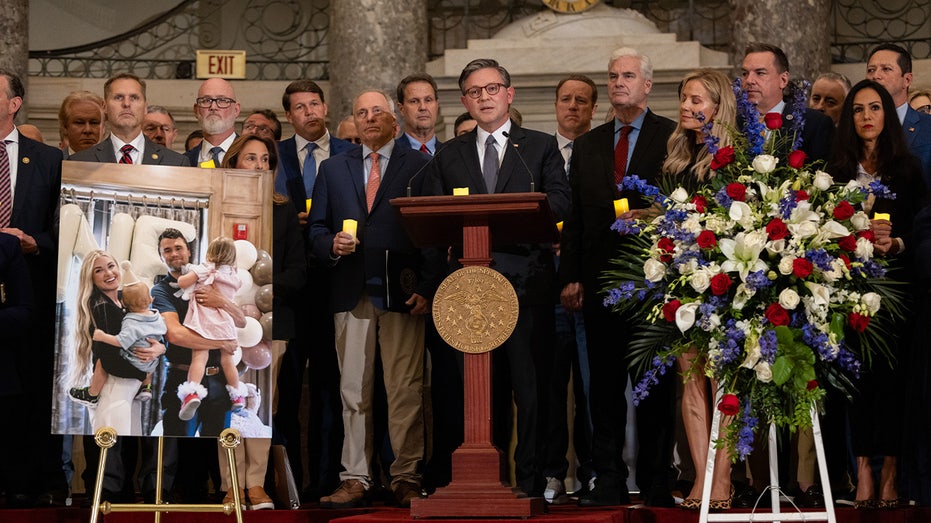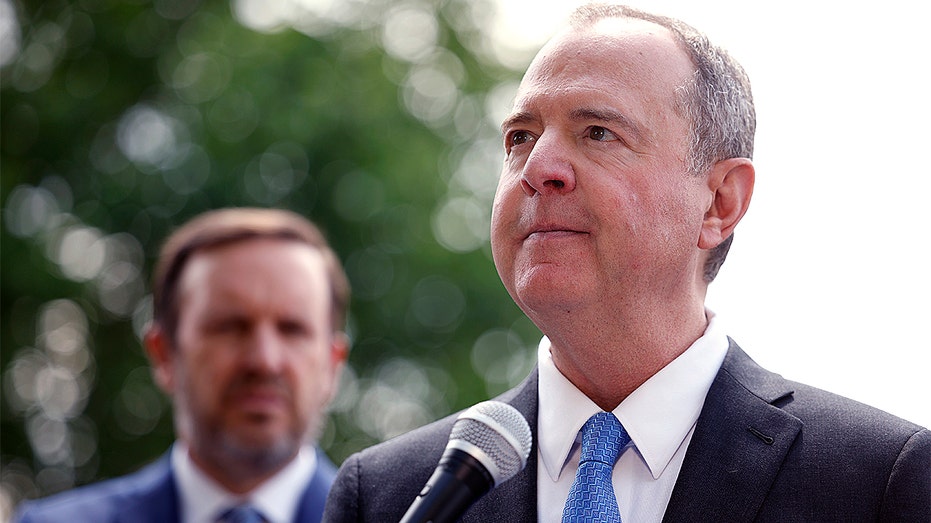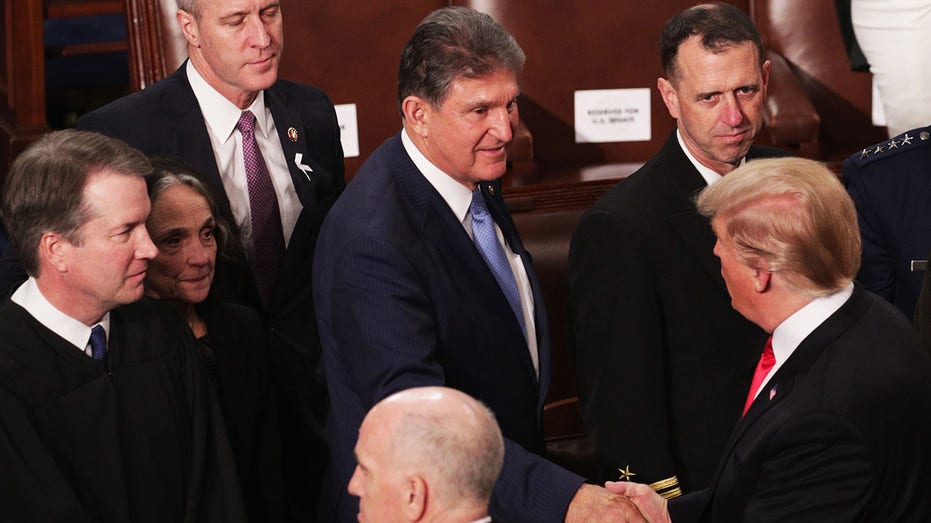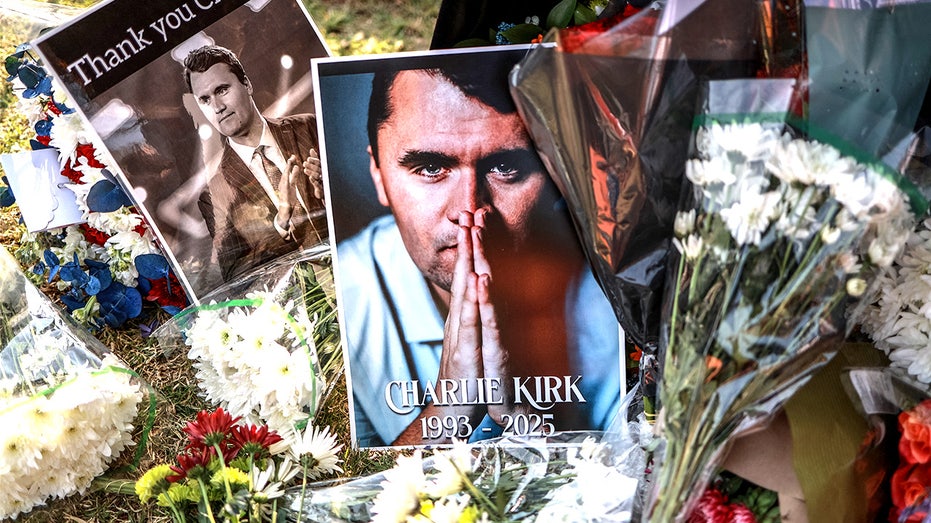4 House Republicans vote with Dems to block resolution censuring Ilhan Omar for Charlie Kirk comments

The House of Representatives voted along bipartisan lines on Wednesday to table a resolution to censure Rep. Ilhan Omar, D-Minn., over comments about Charlie Kirk. Four House Republicans voted with Democrats to table the legislation, effectively blocking it from receiving its own House-wide vote. A vote to table is a procedural mechanism allowing House members to vote against consideration of a bill without having to vote on the bill itself. The measure was blocked in a narrow 214 to 213 vote. The four Republicans who voted to table the measure are Reps. Mike Flood, R-Neb., Tom McClintock, R-Calif., Jeff Hurd, R-Colo., and Cory Mills, R-Fla. ABC REPORTER CALLS CHARLIE KIRK ASSASSIN’S TEXT MESSAGES WITH TRANSGENDER PARTNER ‘VERY TOUCHING’ McClintock told Fox News Digital that while he condemned Omar’s response to Kirk’s death, he voted against moving forward with the censure based on First Amendment grounds. “Ilhan Omar’s comments regarding the assassination of Charlie Kirk are vile and contemptible. They deserve the harshest criticism of every man and woman of good will. But this disgusting and hateful speech is still speech and is protected by our First Amendment,” he said. “Censure is formal punishment by the House and we have already gone too far down this road. Omar’s comments were not made in the House and even if they were, they broke no House rules. A free society depends on tolerating ALL speech — even hateful speech — confident that the best way to sort good from evil is to put the two side by side and trust the people to know the difference.” Hurd responded similarly, “Ilhan Omar’s comments about the assassination of Charlie Kirk, as well as her comments about those who supported Charlie, are ghoulish and evil. I condemn them completely.” “But I voted against today’s censure because it tried to strip another Member of Congress from committees and to silence her for exercising the First Amendment right to free speech. The right response to reprehensible speech like this isn’t silencing: it’s more speech. That’s what Charlie Kirk believed and practiced, and I agree,” he told Fox News Digital. Mills had been facing his own retaliatory censure led by House progressives, but that effort was dropped when Omar’s censure failed. He cited First Amendment grounds on X when explaining his vote as well, however. “The 7 Articles and 27 Amendments of our Constitution are not followed only when it serves your purpose…We may not like or agree with what someone says, but that does not mean we should deny their protected 1A Right,” Mills posted. Flood told Fox News Digital that the proper recourse would be referring Omar to the House Ethics Committee before a censure. “Ilhan Omar’s statements and social media posts are reprehensible and should be referred to the Ethics Committee. The appropriate time to consider a censure motion would be after ethics reviews her conduct,” Flood said. Rep. Nancy Mace, R-S.C., moved to force a vote on the resolution Tuesday by introducing it as “privileged,” a mechanism that requires House leaders to deal with a measure within two legislative days. It’s part of the continued fallout from Omar’s remarks made days after Kirk’s assassination, which conservatives have accused of disparaging the conservative activist’s legacy. SCRUTINY INTENSIFIES OVER SECURITY LAPSES SURROUNDING THE CHARLIE KIRK SHOOTING She specifically faced backlash over an interview with progressive news outlet Zeteo, where she criticized Kirk’s past commentary and Republicans’ reaction to the shooting. She later accused Republicans of taking her words out of context, and she called Kirk’s death “mortifying.” She previously told Zeteo days after Kirk’s assassination that he had “downplayed slavery and what Black people have gone through in this country by saying Juneteenth shouldn’t exist.” “There are a lot of people who are out there talking about him just wanting to have a civil debate,” the “Squad” member said. “There is nothing more effed up, you know, like, than to completely pretend that, you know, his words and actions have not been recorded and in existence for the last decade or so.” She later posted on X amid the backlash, “While I disagreed with Charlie Kirk vehemently about his rhetoric, my heart breaks for his wife and children. I don’t wish violence on anyone. My faith teaches me the power of peace, empathy, and compassion. Right-wing accounts trying to spin a false story when I condemned his murder multiple times is fitting for their agenda to villainize the left to hide from the fact that Donald Trump gins up hate on a daily basis.” Kirk was shot and killed during a college campus speaking event in Utah. Mace introduced her resolution on the House floor Tuesday by reading it on the House floor. “Charlie Kirk was a lifelong advocate for freedom of speech, civil political discourse and the political engagement of youth,” Mace read aloud. “One day after the assassination of Charlie Kirk, Representative Ilhan Omar gave an interview on Zeteo’s town hall with Mehdi Hassan, in which she smeared Charlie Kirk and implied he was to blame for his own murder.” Mace also accused Omar of reposting a video that said, “Don’t be fooled, these people don’t give a single s— about Charlie Kirk. They’re just using his death to further their Christo-fascist agenda.” Other progressives leaped to Omar’s defense, including Rep. Delia Ramirez, D-Ill., who posted on X, “Babe, those are not direct quotes from Ilhan Omar. According to the APA, if you use a direct quotation, it must sustain your claim. The quotes you used are not Ilhan’s words, they are not in context and do not prove your point. Read before you tweet.” It’s one of several measures targeting Omar over her comments. Rep. Buddy Carter, R-Ga., who is running for Senate, introduced his own measure to strip Omar of her committee assignments on Monday.
House clears path for vote honoring Charlie Kirk, denouncing ‘political extremism’

The House voted Wednesday to advance a resolution honoring slain conservative activist Charlie Kirk, clearing the way for floor debate later this week. Lawmakers voted in favor of advancing the measure and a bill to avert a government shutdown in a joint mechanism known as a “rule vote.” The rule was adopted in a 216-210 vote along party lines. Rep. Thomas Massie, R-Ky., who is known to be opposing the federal funding bill, was the lone lawmaker from either side to vote “present.” Massie explained to Fox News Digital that he vehemently supports the Kirk resolution but opposed an unrelated provision in the rule that blocks Congress’ ability from weighing in on tariff policy. ABC REPORTER CALLS CHARLIE KIRK ASSASSIN’S TEXT MESSAGES WITH TRANSGENDER PARTNER ‘VERY TOUCHING’ “I’m a cosponsor of the Kirk resolution, and obviously I will vote for it, but shamefully they turned off Congress’ ability to vote on tariffs with this rule,” Massie said. Rule votes are procedural hurdles that commonly tie together unrelated pieces of legislation that, if adopted, allow House lawmakers to debate each measure individually before respective votes. The current rule’s adoption means House lawmakers could vote on the resolution to honor Kirk on either Thursday or Friday. A vote on the measure to avert a government shutdown, a short-term extension of current federal funding levels called a continuing resolution or CR, is expected Friday morning. It is not surprising that no Democrats supported the rule’s adoption on Wednesday; rule votes traditionally fall along party lines and have rarely seen bipartisan crossover, even if the legislation they include has wide support from both Republicans and Democrats. And while Democrats are largely expected to buck the GOP-led government funding patch, the resolution to honor Kirk’s legacy is expected to get healthy bipartisan support. The Turning Point USA founder was assassinated last week during a college campus speaking event in Utah. The resolution to honor him, led by Speaker Mike Johnson, R-La., lauded Kirk as “one of the most prominent voices in America, engaging in respectful, civil discourse across college campuses, media platforms and national forums, always seeking to elevate truth, foster understanding and strengthen the Republic.” SCRUTINY INTENSIFIES OVER SECURITY LAPSES SURROUNDING THE CHARLIE KIRK SHOOTING It also said Kirk’s “commitment to civil discussion and debate stood as a model for young Americans across the political spectrum, and he worked tirelessly to promote unity without compromising on conviction.” It called his killing “a sobering reminder of the growing threat posed by political extremism and hatred in our society.” Both Democrats and Republicans have released statements condemning political violence in the wake of Kirk’s killing. CLICK HERE TO GET THE FOX NEWS APP The latter measure that advanced on Wednesday evening, the CR, will keep government agencies funded at current levels through Nov. 21 if it’s passed by the House and Senate and signed into law by President Donald Trump. That bill includes a combined $88 million in added security funds for Congress, the judicial branch and the executive branch. Conversations about boosting lawmaker security, in particular, had been ongoing but took on new urgency after Kirk’s death.
Schiff: Patel’s FBI leadership replaced expertise with ‘rabid partisanship’

Sen. Adam Schiff, D-Calif., sharply criticized Kash Patel’s tenure as FBI director Wednesday, telling reporters that he viewed Patel’s leadership as deeply partisan and a “terrible tragedy” for the nation’s sprawling law enforcement agency. Speaking at a news conference alongside former House Speaker Nancy Pelosi, D-Calif., and other House Democrats, Schiff took umbrage at Patel’s testimony one day earlier before the Senate Judiciary Committee, which Schiff said further crystallized his concerns about politicization within the bureau. The FBI “has been the premier law enforcement agency in the country, and the world, because they’ve been constantly professional and non-partisan,” Schiff said Wednesday, noting the close working relationship he had with FBI agents during the years he spent as a federal prosecutor. FBI AGENTS GROUP TELLS CONGRESS TO TAKE URGENT ACTION TO PROTECT AGAINST POLITICIZATION “It is a terrible tragedy, I think, for the men and women of the bureau to have such poor leadership that is replacing expertise with incompetence, that is replacing non-partisanship with the most rabid partisanship,” Schiff told Fox News Digital. “And this is not unrelated to why we’re here today.” His remarks come as Patel appeared on Capitol Hill Wednesday for a second day of testimony before the Senate and House Judiciary committees. FBI AGENTS DETAIL J6 ROLE IN EXHAUSTIVE QUESTIONNAIRE EMPLOYEES ‘WERE INSTRUCTED TO FILL OUT’ Both hearings were marked by sharp lines of questioning from Democrats, who grilled Patel on issues ranging from a flurry of FBI firings, the bureau’s handling of the Epstein files and concerns of politicization, among many other topics. Schiff, in particular, pressed Patel on his tenure at the FBI, saying the bureau’s agents — mostly assigned to its 52 field offices across the country and loath to see their work politicized — wanted to know what, if any, marching orders Patel had received from President Donald Trump. The heated back-and-forth devolved into a shouting match between the two as Schiff pressed Patel repeatedly on the firings of FBI agents and whether those individuals were removed for political reasons. Patel, for his part, described Schiff as a “political buffoon.” Speaking to reporters Wednesday, Schiff said Patel’s appearance did little to assuage his broader fears of weaponization within the bureau. “You can’t have a vibrant democracy without the rule of law,” he told Fox News Digital. “You can’t have the rule of law if you have a weaponized FBI and a weaponized Justice Department, and, sadly, that’s what we have here today,” Schiff said. He also weighed in on Patel’s remarks yesterday on the Epstein files, another issue that sparked intense criticism from lawmakers, after Patel claimed Tuesday that there was “no credible evidence” that Jeffrey Epstein was trafficking women other than for himself. Schiff said it was a “startling claim,” particularly from someone who had previously promoted the belief that Epstein maintained a vast client list of powerful people. “So, it was completely contradictory to everything he said in the past,” he said. He also noted Patel’s “refusal” to answer his questions on why Deputy Attorney General Todd Blanche declined to press Ghislaine Maxwell further on the Cabinet members she identified as being “close” to Epstein or having a relationship with him during a two-day interview in July. “Blanche refused to ask who they were and just ignored her comment,” Schiff added. “And this is, again, the kind of incompetence we’re seeing,” he said. “Incompetence is probably the most polite thing I can describe, but it certainly looks like a cover-up.” The Justice Department and FBI have struggled to quell the mounting public pressure on them to release more information related to the Epstein investigation, underscoring the story’s sticking power in a fast-moving news cycle and among Trump supporters, who have been some of the leading voices in demanding the information be released.
Gun seller tells Ryan Routh: ‘I heard of you threatening people’ in tense courtroom exchange

Jurors in the federal trial of Ryan Routh — accused of attempting to assassinate President Donald Trump at his West Palm Beach golf club in 2024 — heard pivotal testimony Wednesday from the man prosecutors say sold Routh the semiautomatic rifle tied to the case. Ronnie Jay Oxendine, a North Carolina roofing contractor recently convicted on a firearm charge, told jurors, “I have to come to this court and tell the truth” as part of his plea deal. Shown the weapon, Oxendine said, “That used to be my rifle.” Oxendine testified that in August 2024, intermediary Tina Cooper arranged a sale in the fenced parking lot of his office. FBI PHONE EXTRACTIONS, DNA TESTIMONY HEADLINE DAY 7 OF RYAN ROUTH TRIAL “Ryan gave me $350 for the rifle and gave Tina $100,” he said. He added Routh worked the bolt, asked for ammunition and said he wanted the gun because his son “was being intimidated by his roommates.” Oxendine said Routh told him he “would remove the serial number… so it wouldn’t come back.” He also told prosecutors he had roughly 300 firearms, denied ever removing a serial number himself, and admitted the FBI later charged him with possession of a sawed-off shotgun. He faces up to 10 years in prison and a $250,000 fine. During cross-examination, Routh began by telling Oxendine, “Great to see you again… I know you’re extremely mad at me,” before asking if the year he has already spent in custody could be applied to Oxendine’s sentence. Judge Aileen Cannon struck the comment from the record and warned Routh against further outbursts. RYAN ROUTH TRIAL CONTINUES AFTER AGENT TESTIFIES SUSPECT AIMED RIFLE AT HIM ON TRUMP’S GOLF COURSE Routh asked Oxendine about whether he knew him to be violent. “Have you ever known me to hurt anyone?” Routh asked. Oxendine replied, “I know you were loud.” When asked if he knew Routh to be gentle, Oxendine said, “I don’t know you that well. I heard of you threatening people.” The courtroom also heard from FBI Task Force Officer Patrick Lantry about surveillance at a South Bay, Florida truck stop, where investigators found orange earplugs and empty Vienna sausage cans. Routh’s questioning took a turn when he addressed the empty Vienna sausage cans on the ground around the truck stop. He said there were bugs and ants crawling around and then asked if it was possible food was left out to feed them. Lantry replied that it was possible, and then Routh said it was a nice gesture but that whoever left the food did not clean up, and that he should have. RYAN ROUTH TRIAL: JURY SELECTION BEGINS IN TRUMP ASSASSINATION ATTEMPT CASE AT&T employee Aaron Thompson testified that Routh bought a prepaid line under the name “John White.” When Routh told him, “I don’t know how trustworthy you are,” Cannon struck it from the record. CLICK HERE TO GET THE FOX NEWS APP Prosecutors are expected to wrap up their case on Thursday. The defense has been told to have its witnesses ready on Friday. Routh has indicated he’ll call a firearms expert and character witnesses, but it’s still unclear if he’ll testify on his own behalf. Fox News’ Samantha Daigle contributed to this report.
After backpedaling on threatening rhetoric, Newsom says his political strategy is unchanged

California Gov. Gavin Newsom told reporters Charlie Kirk’s assassination has not changed the way he plans to approach campaigning, even after dropping a threatening name for an upcoming anti-Trump campaign. The rally was originally called the “FAFO50” campaign, a reference to the phrase “F— around and find out,” which is a slang warning meaning “if you keep doing something, you’ll regret it.” “DONALD TRUMP IS F—— AROUND. NOW HE’LL FIND OUT,” the campaign’s marketing materials read before they were changed, according to archived images of the campaign’s website, as well as screenshots from the campaign’s official X account. The website for the campaign, which is aimed at passing an anti-gerrymandering ballot measure called Proposition 50, was ultimately changed from “FAFO50.com” to “YesOn50Live.com.” “FAFO” messaging on the campaign’s website and social media account was also removed, and a related event was subsequently referred to as a “Voter Registration Day Rally” on the campaign’s social media. LAWMAKERS SHARE VIEWS ON POLITICAL DISCOURSE IN US FOLLOWING CHARLIE KIRK ASSASSINATION During an event promoting a new initiative to improve the well-being of young men and boys on Tuesday, Newsom was asked whether the rebrand was part of a changing calculus for the governor on how he intends to approach campaigning going forward. “No,” Newsom insisted. “Because I’m the same guy that walked on the tarmac with Donald Trump. I’m the same guy that would pick up his phone call. I’m the same person that sat down not just with Charlie Kirk, but with Steve Bannon, with the guy who created this space, you know, ‘Language, Borders and Culture,’ Michael Savage, back in the ’90s, you know, was the dominant voice on talk radio. The person that sat down with Newt Gingrich, who was one of the leaders of my recall. I’m that same person.” Newsom’s response followed a different question about the California governor’s new initiative supporting young men and boys. The governor was asked whether Kirk’s death played any role, or inspired the governor, in shaping the newly announced initiative, which builds on efforts Newsom initiated through a statewide executive order he signed earlier this summer. “I appreciate the question. I mean, I believe in civility. I believe in an open hand, not a closed fist,” Newsom responded. “I just think, at the end of the day — I said it inside a moment ago — divorce is not an option, period. Full stop. We’ve got to live together, across our differences, and there are a lot of differences in this state, this nation, for that matter, the world we’re trying to build.” The nature of political discourse in the United States has become a major point of debate following Kirk’s assassination that occurred last week. Lawmakers from both sides of the aisle have called on others to “turn down the heat” in the wake of Kirk’s assassination. NEWSOM WARNS AMERICANS ‘YOU WILL LOSE YOUR COUNTRY’ UNDER TRUMP AT CALIFORNIA SUMMIT The Trump administration’s Department of Homeland Security (DHS) put out a call for “the media, leftist groups, and sanctuary politicians” on Wednesday to tone down the “hateful rhetoric” targeting immigration enforcement officers, arguing it has contributed to “political violence in our country and a more than 1000% increase in assaults against our brave ICE law enforcement.” “This demonization is inspiring violence across the country,” Assistant Secretary Tricia McLaughlin warned. “We have to turn down the temperature before someone else is killed.” One example cited by DHS were comments by Rep. Jasmine Crockett, D-Texas, a member of the cohort of progressive lawmakers on Capitol Hill known as “the squad.” During an interview with MSNBC on Sunday, Crockett likened ICE officers to slave catchers. “As someone who understands history, when I see ICE, I see slave patrols,” Crockett said. Meanwhile, rhetoric from Newsom’s “Voter Registration Day Rally” similarly likened Republican-led redistricting efforts to “pre-Jim Crow” era policies. “It’s about knowing that you can walk outside your home and not be detained and deported, not be lynched, because of the color of your skin,” California state legislator, Rep. Sydney Kamlager-Dove, said during the Tuesday night virtual rally promoting her state’s Proposition 50. “[Republicans] are doing every single thing that they can to take us back to pre-Jim Crow. And I am not being hyperbolic.” Fox News Digital did not receive a response after reaching out to Newsom’s office and campaign team to see if the governor, or any of his representatives, wanted to comment further about the decision to rebrand Tuesday night’s event promoting Proposition 50 and the broader issue of inflammatory political rhetoric following Kirk’s assassination.
Manchin recalls close ties with ‘outsider’ Trump, cold shoulder from Obama in new book

Former Sen. Joe Manchin, I-W.Va., said he spoke more with President Donald Trump in the first two years of Trump’s term than with former President Barack Obama during Obama’s eight years in office. In his new book, “Dead Center: In Defense of Common Sense,” released this week, Manchin outlined a cordial working relationship with Trump and a far chillier, less active back and forth with Obama. Manchin, who switched from the Democratic Party to become an Independent before retiring from the Senate last year, wrote that he considered Trump a fellow “outsider” when he arrived in Washington, D.C., for his first term and lauded him as the “most engaged president I ever worked with” since former President Bill Clinton. MANCHIN SAYS HE WANTED GOP TO WIN SENATE TO STOP DEMOCRATS’ QUEST FOR ‘RAW POLITICAL POWER’ “From the start, President Trump had an open line of communication with me,” he wrote. “I spoke to him more in the first two years of his presidency than I did to President Obama during all eight years of his time in office.” He noted, “If you want to have influence with Donald Trump, you have to be the last person he talks to about a topic,” and said he would jokingly ask that the president ensure he was the last person he called. “He’d laugh, and we’d talk it out,” he said. He recalled his 2018 election campaign in the wake of Trump’s dominant, 40-point win in the state. Trump told Manchin that he was being pressured to campaign against him and promised he wouldn’t. Ultimately, Trump visited the state five times, but Manchin still came out on top. JOE MANCHIN TELLS ‘THE VIEW’ WHY HE COULDN’T ENDORSE KAMALA HARRIS He was later invited to the Oval Office to meet with Trump, where, in front of then-Vice President Mike Pence and Ivanka Trump, the president “blurted to his other guests, ‘I told you we couldn’t beat him,’” Manchin wrote. Manchin’s relationship with the former president goes back to his time as governor of West Virginia, when Obama was still a senator. The two worked together on a coal deal in Illinois that had previously excluded West Virginia. During the 2008 election cycle, he said he invited both then-Sen. Hillary Clinton, D-N.Y., and Obama to come to West Virginia to campaign, but said Obama shook off the invitation and told him, “Let’s be honest with each other — my demographics don’t work well in your state.” NEW BOOK REVEALS WHAT OBAMA AND ‘CONQUEROR’ TRUMP CHATTED ABOUT IN VIRAL MOMENT DURING CARTER’S FUNERAL “But he didn’t come, and that night belonged to Hillary,” he wrote. “She made the most of her visit and won the primary by 41 points.” He said their relationship became even chillier when Obama launched his “war on coal” with a push for green initiatives that targeted fossil fuels and states like West Virginia. Manchin argued that the Democratic Party had grown dismissive and lost touch with the working class as a means to reshape their agenda through a progressive lens. That led to a seismic shift in West Virginia’s political alignment, from Democratic to now largely Republican, he said. And in the process that began when Obama won in 2008, he said that rural states like his felt “overlooked and undervalued.” “But that’s exactly how Democrats handled West Virginia, and no one embodied that disconnect more than President Obama,” he wrote. Fox News Digital reached out to Obama’s office and the White House for comment but did not immediately hear back.
Reporter’s Notebook: Congress fails to lower political temperature after Charlie Kirk assassination

There is no thermostat in the U.S. Capitol. Only thermometers. And that’s why congressional leaders are struggling to lower the temperatures in Congress after the murder of Charlie Kirk. As a veteran congressional reporter, I lost count of how many efforts I witnessed to try to “lower the temperature” around Capitol Hill after a national tragedy. Oh, they might knock a degree off the mercury for a few weeks here and there – sometimes helped by a political cold front (e.g. a lengthy congressional recess). But just like in meteorology, the political gales blow. Weather systems develop. There are dips in the jet stream. Droughts parch the political landscape. Alberta Clippers race through in November and December. All of this results in inevitable thaws. So after some solace, it usually isn’t long until a Category 5 hurricane churns off the Capitol Hill coast. KASH PATEL FACES HOUSE GRILLING AFTER TENSE SENATE CLASHES OVER KIRK ASSASSINATION The temperature then skyrockets. In meteorology, there are always temperature “norms.” Yes, it’s seasonal to climb into the mid-90s in Washington, D.C., in August. But not unheard of to have high temperatures in just the mid-70s like this year. Those are the anomalies. The same with Congress. The typical “seasonal” temperature on Capitol Hill always spikes toward 100 degrees. Even during the frigid calendar days of January and February. To wit: There were raucous episodes on Capitol Hill in the mid 1990s after Republicans seized control of the House, which nearly devolved into fistfights. A national tragedy didn’t spur the contretemps. It was an electoral one. That fueled a visceral distrust between Republicans and Democrats. It was augmented by the fact that Republicans won control of the House in 1994 for the first time in four decades. Results at the ballot box sparked those skirmishes. But it was violence and calamity that stoked many of the embers on Capitol Hill. Members sought to quiet things after two Capitol Police officers were shot and killed in 1998. But the temperature shot back up. The same with 9/11. The fourth plane that eventually crashed in Shanksville, Pa., was destined for the U.S. Capitol. After the immediate threat subsided, bipartisan members gathered on the Capitol steps and spontaneously sang God Bless America. That moment emerged as an indelible, uplifting moment on one of the most horrific days in American history. SQUAD MEMBER GIVES BLUNT RESPONSE WHEN ASKED WHY DEMS ARE CELEBRATING POLITICAL VIOLENCE AFTER KIRK’S DEATH But the temperature shot back up. Tea party protesters encircled the Capitol in 2010 as Democrats attempted to pass Obamacare. Vile phone calls and threats flooded congressional phone lines. Lawmakers called for calm in an effort to quiet the vitriol. But the temperature shot back up. A gunman killed six people and seriously wounded former Rep. Gabrielle Giffords, D-Ariz., and future Rep. Ron Barber, D-Ariz., in 2011. Members dialed back the rhetoric. But the temperature shot back up. Capitol Police officers were injured during a high-speed chase around the congressional complex during the 2013 government shutdown. Lawmakers again demanded calm. In fact, lawmakers found the injury of the officers working to protect them – yet not receiving a paycheck – so sobering that it prompted them to re-open the government. But the temperature shot back up. A gunman shot House Majority Leader Steve Scalise, R-La., during a congressional baseball practice in 2017, in Alexandria, Va. TED CRUZ SAYS HATE SPEECH ‘ABSOLUTELY’ PROTECTED BY FIRST AMENDMENT FOLLOWING CHARLIE KIRK’S ASSASSINATION People chilled out. But the temperature shot back up. The Jan. 6, 2021, riot at the Capitol is one of the most onerous days in congressional history. Leaders again insisted on peace. However, there was nearly a fistfight in the rear of the chamber not long after the House reconvened after the mayhem in the wee hours of Jan. 7. Again came the demands for you know what. But the temperature shot back up. House Speaker Mike Johnson, R-La., is the latest congressional leader to face the arduous task to lower the temperature after the assassination of Kirk. House members bowed their heads in a moment of silence. When Johnson rapped the gavel, Rep. Lauren Boebert, R-Colo., asked Johnson for a verbal prayer. She said silent prayer didn’t get results. GOP UNVEILS PLAN TO AVERT GOVERNMENT SHUTDOWN, INCLUDES $30M SECURITY HIKE AFTER CHARLIE KIRK KILLING “Is there someone who could lead us in a moment of prayer out loud for Charlie and his family?” inquired Boebert as Johnson tried to shush the chamber. She also mentioned “victims in Colorado,” referring to a shooting at a Colorado high school the same day. Grumbling and groans filled the chamber as Boebert tried to speak. “Wait a minute. Wait a minute,” Johnson said from the dais. “The House will be in order.” Johnson tried to quiet the sniping back and forth across the aisle. “The House will be in order!” hollered Johnson as the din rose in the chamber. Both Rep. Anna Paulina Luna, R-Fla., and Rep. Jahana Hayes, D-Conn., continued yelling. “The House will be in order!” thundered a now angry Johnson. The speaker slammed down the gavel and stared daggers toward the Democratic side of the chamber. HOUSE REPUBLICANS HONOR CHARLIE KIRK WHILE DEM LEADERS SKIP CAPITOL PRAYER VIGIL You see the pattern. It is seemingly always the same on Capitol Hill. The pattern never seems to change. Yes, you may have days in the 70s during the dog days of August in Washington. But the temperature eventually returns to the upper 90s. That’s the political norm on Capitol Hill. The question is, “Will it ever change?” It’s hard to see things “changing.” If they were going to “change,” that probably would have happened after 9/11, the Giffords attack, the baseball practice shooting or Jan. 6. Any one of those catastrophes could have served as an impetus to “change” things on Capitol Hill. One would think. But there’s been no change in the political climate. That’s partially because there’s been so much turnover
House Dem warns both sides on ‘road to ruin’ as political divide deepens over Kirk assassination

EXCLUSIVE: A moderate House Democrat said he believes both Republicans and his own party have fallen short in their responses to the assassination of Charlie Kirk. “I’m disappointed. I wish that there was more effort as a group, Democrats and Republicans, to express condolences for his family and for him, and to express the real sadness that it engenders,” Rep. Tom Suozzi, D-N.Y., told Fox News Digital in an interview. He warned later, “Punch, counter-punch is the natural reaction of most human beings. But we can’t just keep on doing this. It’s very destructive, and it’s a road to ruin.” Suozzi said he believed leaders, in particular, on both sides of the aisle needed to do more. ABC REPORTER CALLS CHARLIE KIRK ASSASSIN’S TEXT MESSAGES WITH TRANSGENDER PARTNER ‘VERY TOUCHING’ “I don’t think there’s been enough of an effort to try and bring us together,” he said. The New York lawmaker was one of a handful of Democrats who attended a memorial vigil in Kirk’s honor called by House Speaker Mike Johnson, R-La., at the U.S. Capitol on Monday. House Minority Leader Hakeem Jeffries, D-N.Y., told reporters that he did not attend because he “had a meeting.” But Suozzi said he spoke with several House Democrats who said they simply were not aware it was happening. “I’m not casting blame on anybody, Democrats or Republicans. I don’t know the facts as far as what kind of outreach was made,” Suozzi said. SCRUTINY INTENSIFIES OVER SECURITY LAPSES SURROUNDING THE CHARLIE KIRK SHOOTING “I do know that I spoke to several members, you know, [Democrats] that I know that attend the bipartisan prayer breakfast, for example. And they said, ‘Oh, I didn’t even know about it.’” Both Jeffries and Johnson have made calls for unity in the wake of Kirk’s killing last week, and lawmakers have expressed bipartisan condemnation of political violence. But partisan tensions have erupted since then, with Republicans blaming Democrats for their anti-GOP rhetoric and for fomenting the political tension that led to Kirk’s death. Democrats, in turn, have accused Republicans of similarly inflaming tensions both before and after the assassination. In the House, scrutiny has been centered on Rep. Ilhan Omar, D-Minn., after an interview with progressive news outlet Zeteo, where conservatives have accused her of disparaging Kirk’s legacy days after his death. “There are a lot of people who are out there talking about him just wanting to have a civil debate,” Omar said. “There is nothing more effed up, you know, like, than to completely pretend that, you know, his words and actions have not been recorded and in existence for the last decade or so.” The Minnesota progressive also called Kirk’s death “mortifying” and expressed condolences for his wife and young children. Rep. Nancy Mace, R-S.C., is now moving to force a vote to censure Omar for her comments, a move Suozzi called “very unhelpful.” When asked about Omar’s remarks, Suozzi did not mention her directly but said, “I just don’t think that this is the time to be trying to incite more anger for people.” If he was able to give remarks at Kirk’s vigil, for example, Suozzi said, “I would say I didn’t really know Charlie Kirk or much about him before this incident. But like everybody, I’ve been seeing all the media reports since his assassination, and I saw a couple different times people would ask, ‘What, what would you want to be remembered for?’ And he said, ‘I want to be remembered for having the courage to live my faith.’” “One of the most difficult concepts that Jesus ever had was to love your enemies,” Suozzi said. “And that’s what we need to be doing right now.” Suozzi also blamed the current social media environment for fueling divisions. CLICK HERE TO GET THE FOX NEWS APP “We have to understand that there are very strong forces working against us right now. Social media is, you know, being corrupted, I think, not only by our foreign adversaries, but also by people trying to get political or financial gain,” he said. “I think that we have to be very conscious of the fact that there are people that use our freedom of speech and use our social media … that are just lying and putting up doctored videos and explosive commentary to get us … to hate each other.”
DHS blames political rhetoric for surge in assaults on ICE agents after Charlie Kirk murder

EXCLUSIVE: The Department of Homeland Security on Wednesday identified what it called dangerous political rhetoric targeting immigration enforcement in the wake of conservative activist Charlie Kirk’s assassination, warning that such language is fueling violence against officers. “This hateful rhetoric is contributing to political violence in our country and a more than 1,000% increase in assaults against our brave ICE law enforcement,” the department told Fox News Digital. “Following the evil act of political violence in the country and two brutal assaults on our brave ICE law enforcement last week, we are once again calling on the media and the far left to stop the hateful rhetoric directed at President Trump, those who support him, and our brave DHS law enforcement,” added Assistant Secretary Tricia McLaughlin. McLaughlin said such “demonization” is inspiring violence nationwide: NOEM SAYS ICE AGENTS ARE FACING ‘1000% INCREASE IN ASSAULTS’ “We have to turn down the temperature before someone else is killed,” she said. In examples provided to Fox News Digital, DHS cited the “evil act of political violence witnessed… last week” when Kirk was murdered in Utah, plus two incidents during attempted capture of immigration suspects that led to severe injuries to officers. “DHS is calling on the media, leftist groups, and sanctuary politicians to end their demonizing DHS law enforcement,” the department said. In a set of examples provided to Fox News Digital of such inflammatory political rhetoric, the department led off with Rep. Jasmine Crockett, D-Texas, who told MSNBC earlier this month that immigration enforcement officers are akin to slave catchers. “As someone who understands history, when I see ICE, I see slave patrols,” Crockett said Saturday. DHS also flagged Minnesota Gov. Tim Walz’s comments during a commencement speech at the University of Minnesota when he called ICE the “modern-day Gestapo” – a direct reference to the Geheime Staatspolizei who enforced authoritarian law in Nazi Germany. Illinois Gov. JB Pritzker has also been vocal in his criticisms of President Donald Trump’s immigration enforcement operations, and DHS cited his recent remarks characterizing the U.S. as “essentially” becoming a country akin to Nazi Germany where people had to carry around “papers” to “prove [they] belong.” UNION BOSS COMPARES ICE TO AL PACINO MOBSTER AS MORE DEMS PILE ON IMMIGRATION ENFORCEMENT The department also condemned comments from Boston Mayor Michelle Wu in June: “I don’t know of any police department that routinely wears mask – We know that there are other groups that routinely wear masks. NSC-131 routinely wears masks,” she said, referring to a Massachusetts-based “National Socialist Club” tied to neo-Nazism. DHS also condemned House Minority Leader Hakeem Jeffries, D-N.Y., for pledging to fight against Trump’s agenda “in the streets,” suggesting it is fomenting violence. It also cited Rep. John Larson, D-Conn., who was pictured in August screaming during a press availability that immigration enforcement is acting like the “S.S.” (Nazi secret police) and “Gestapo.” “This is not Germany. That’s the SS and the Gestapo. This is the United States of America. Unmask yourselves,” Larson shouted at an event in Newington. Larson added it is a good time to “rise up,” after federal immigration enforcement raided a car wash in the New England community. Further cataloging physical violence against ICE and DHS officers, the department provided to Fox News Digital an accounting of the most egregious attacks, including a group of armed men who staked out a facility in Texas earlier this year. CLICK HERE TO GET THE FOX NEWS APP A separate Texas incident cited involved a gunman opening fire at a Border Patrol annex in McAllen – near the Mexican border. “The suspect was neutralized by law enforcement who acted heroically to stop the shooter before there was any loss of life. However, three were injured,” the department said. On Aug. 29, a woman in Maine allegedly tried to run over a federal agent with her car as he was making an arrest. The department also cited several instances of suspects causing harm to officers or damage to property.
Hegseth orders about face on Pentagon’s slipping grooming standards

The Pentagon unveiled a new overhaul of grooming standards to further ensure service members are ‘clean-shaven’ this week. War Secretary Pete Hegseth has ordered that troops needing a medical exemption can retain facial hair for one year as long as they are following a plan to treat the condition. After that, they must remove facial hair or face separation. “The Department must remain vigilant in maintaining the grooming standards which underpin the warrior ethos,” Hegseth wrote in an Aug. 20 memo made public on Monday. Leadership will also be required to conduct a review of how grooming standards have changed over the last decade. FEMALE MILITARY RECRUITS SURGE ACROSS ALL SERVICE BRANCHES “The grooming standard set by the U.S. military is to be clean-shaven and neat in presentation for a proper military appearance,” Hegseth said, according to the statement by chief Pentagon spokesperson Sean Parnell. “Commanders must apply consistent criteria and appropriately consider the department’s interests in safety and uniformity when authorizing individual exceptions,” Parnell added. The memo did not mention whether troops would still be allowed to sport a mustache, as they have been for decades. Hegseth’s office did not return a request for clarification in time for publication. Most shaving waivers are for troops diagnosed with pseudofolliculitis barbae, or PFB, a condition where the hair curls back toward the skin after shaving and causes irritation. HEGSETH TEARS UP RED TAPE, ORDERS PENTAGON TO BEGIN DRONE SURGE AT TRUMP’S COMMAND Hegseth’s memo did not address religious accommodations. The Army began granting beard exemptions in 2017 after pressure from Sikh soldiers, for whom uncut facial hair is a religious requirement. Some troops soon tested the policy’s boundaries. In 2018, one soldier won approval for a beard by claiming adherence to the Norse Pagan faith, identifying himself as a Heathen. CLICK HERE TO GET THE FOX NEWS APP In 2019, Army Spc. John Hoskins pushed the limits by applying for a religious exemption and claiming to belong to the Church of the Flying Spaghetti Monster, a faith known as “Pastafarianism.” He was denied. The Army announced an update to its grooming standards this week, also defining authorized hairstyles and ponytail lengths for female soldiers, who are permitted to wear only clear nail polish.

